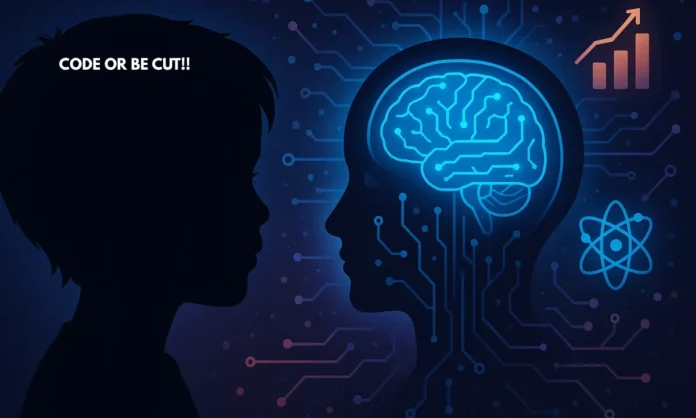Summary
- DeepMind CEO Demis Hassabis warns that teens must master AI tools to stay competitive as the world nears artificial general intelligence (AGI).
- At Google I/O and on the Hard Fork podcast, he urged students to develop STEM skills alongside adaptability, creativity, and cognitive agility.
- Hassabis believes AI is not just the future but the present — and early adopters will dominate tomorrow’s job market.
Future-Proofing a Generation: Why Hassabis Urges Teens to Embrace AI Now
At the Google I/O developer conference and again on the Hard Fork podcast, DeepMind CEO Demis Hassabis didn’t sugarcoat the future. For Gen Alpha — those born roughly after 2010 — the message was sharp: artificial intelligence is the defining force of their lifetime, and falling behind now means being irrelevant later.
Hassabis heads Google DeepMind, the company’s most advanced AI research division and the group leading the charge toward artificial general intelligence (AGI) — a machine capable of human-like reasoning. He believes AGI could arrive within the next decade. In such a rapidly evolving environment, staying uninformed is not an option.
Rather than stoking fear, Hassabis focused on opportunity. Just as the internet shaped millennials and smartphones defined Gen Z, he predicts generative AI will leave its imprint on Gen Alpha. This makes the stakes personal. Whether in classrooms, social lives, or future careers, today’s teens will either master AI tools — or be mastered by them.
Demis Hassabis says today's AI lacks consciousness, but self-awareness could emerge "implicitly."
— vitrupo (@vitrupo) April 21, 2025
Models may soon need to understand "you, self, and other" — the early elements of awareness.
They lack imagination now, but in 5–10 years, Hassabis predicts they'll solve and pose… pic.twitter.com/7uVZDMRPLu
The Skillset Shift: AI Demands More Than Just Coding
- Hassabis stressed that understanding how AI functions is more important than mastering any single tool.
- He recommends teens become “ninjas” in the use of AI technologies through self-driven learning.
- While STEM skills remain vital, meta-skills like creativity, adaptability, and resilience will become non-negotiable.
- He warned that hard skills alone may quickly become obsolete as machines take over more tasks.
- “Learning to learn” is, according to him, the real long-term advantage.
Hassabis was clear: technical knowledge matters — but it’s not enough. The students of today will need cognitive flexibility to navigate the disruptions AI is already beginning to trigger. Coding, yes. But also the ability to pivot, adapt, and keep learning in unpredictable environments.
He described AI as an extension of human potential, not a replacement. The critical differentiator, in his view, is the ability to understand and manipulate the tools, not just follow instructions. “Learning how to learn,” he said, will outlast any specific programming language or platform.
In his podcast appearance, he encouraged a shift from passive consumption of education to active exploration. Teens, he suggested, should use their free time to tinker with emerging tools — ChatGPT, Gemini, AI image generators — and treat it as self-discovery. University, in this vision, is not just for job prep; it’s where the next AI thinkers must be shaped.
Education in an AGI World: What Schools Must Prepare For
- The AI revolution is advancing faster than education systems can adapt.
- Hassabis supports integrating AI literacy into high school and university curricula immediately.
- He believes institutions must focus not just on technical content, but on nurturing curiosity and independent thinking.
- University students should explore outside their syllabus to stay updated.
- Educators need to balance foundational STEM education with flexibility and exploration.
As the pace of AI advancement accelerates, education systems are struggling to keep up. Hassabis’s prescription is not to dismantle traditional STEM education — but to reframe it. Schools must teach the basics, yes, but also make room for experimental learning and interdisciplinary inquiry.
Students should be encouraged to break out of rigid academic tracks. “Use your undergrad years to understand how you learn,” he advised, emphasizing that introspection, curiosity, and agility will ultimately prove more valuable than test scores or GPAs.
This presents a profound challenge for educators: how to cultivate students who are not just technically proficient, but resilient and creative in a world where AI is both a tool and a competitor. Hassabis’s ideal student isn’t just a coder — it’s someone who can outthink the machine.
Gen Alpha’s Race Against Time: Why Hassabis’s Warning Matters
Demis Hassabis isn’t just theorizing about the future — he’s building it. As the brain behind DeepMind’s biggest breakthroughs and one of the few people on Earth actively engineering AGI, his perspective is not speculative. His warning to teens — and by extension, to parents, educators, and policymakers — must be taken seriously.
AI is already disrupting job markets, social norms, and creative industries. But the biggest shift is coming: a world in which machines don’t just assist humans, but match or surpass them in many cognitive tasks. In such a landscape, the only sustainable edge is human versatility.
For Gen Alpha, the message is stark: curiosity, adaptability, and proactive learning aren’t optional anymore. They’re survival skills. The early movers who understand how to learn, unlearn, and relearn will be the architects of tomorrow’s economy. Everyone else may find themselves playing catch-up — or worse, left out altogether.


